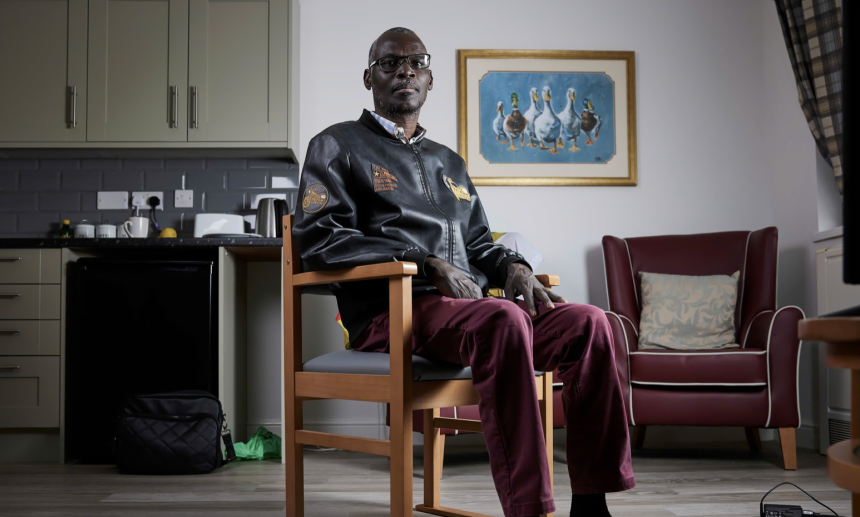After agitating against Robert Mugabe in Harare in the late 90s, Patson Muzuwa fled to the UK. He continued the fight from afar, and became a tireless torchbearer for those he had to leave behind.
In June, I visited a man named Patson Muzuwa in a care home in a former mining village near Durham. The centre had spacious bedrooms, friendly staff and an activity room decorated with a lifesize King Charles cut-out and union flags. At 56, Muzuwa was the youngest resident; most were elderly and had dementia. The local council had moved him here temporarily a few weeks before, after his medical needs made it impossible for him to stay with his son.
Muzuwa has lived at least 10 lives. As a young man in Zimbabwe, he became a member of the main opposition party to President Robert Mugabe’s autocratic rule and found himself hounded by security forces. After he resettled in the UK, he became a key part of the Zimbabwean community, organising resistance to Mugabe from abroad. Meanwhile, his personal life has veered between extraordinary highs and lows, and with his charm he has left a mark on almost everyone he has met. His story is a poignant reminder of the pain of political exile from your home country, and the challenges that face asylum seekers in the UK, even after they have been granted leave to stay.
I first met Muzuwa in November 2000. I had grown up in Zimbabwe, my mother’s birthplace, in the 1970s and early 80s, but moved to the UK as a teenager. I used to return to Zimbabwe fairly regularly to visit family and do reporting, but this was my first trip back in a long time. At a protest against government corruption, I watched a few dozen people wend their way through Harare city centre, with its ornate old Cape Dutch-style buildings and modern high-rises. As the police looked on, people waved banners and toyi-toyied – a rhythmic, foot-stomping protest dance – while singing defiant songs about government corruption.
A slim, hollow-cheeked man moved nimbly through the crowd, galvanising people with his singing. He saw me taking photos and came over to introduce himself. His name was Patson, he said, and he handed me a T-shirt with the words “Combatting corruption collectively in the new millennium”, printed on the back. “We are the people, the ones making the economy,” he told me. “But we’re living in shacks, while the politicians are living lavishly. They’re like ticks sucking our blood.” He said he could show me the “shameful manner” in which ordinary Zimbabweans lived. We arranged to meet again so he could take me to his home in Rugare, a township on the edge of the city.
The townships surrounding the capital had been seen as cradles of revolt during the white-minority rule of Ian Smith, who was prime minister of Rhodesia, as the country was then called, from 1964 until 1979. By the turn of the millennium, the Mugabe regime, which had been in power since 1980, had come to view them in the same way. In the recent election, in June 2000, Rugare, like the country’s other populous poor urban areas, had rejected the ruling Zanu-PF party in favour of the newly formed Movement for Democratic Change (MDC). Mugabe called the MDC “western-sponsored stooges”, and his party directed a wave of violence against it during the election, in which 32 opposition supporters were killed.
The day after we met, Muzuwa gave me a guided tour of Rugare. He instructed a group of youths to perform an impromptu gymnastics routine in my honour, and introduced me to a talented artist who proudly displayed his soapstone sculptures. We met Muzuwa’s fellow MDC members, who told me of beatings they had received from political opponents. Muzuwa also introduced me to one of Rugare’s few supporters of Zanu-PF, Mugabe’s political party. “We share the same troubles. We found common ground, even though we’ve got different thinking,” Muzuwa said.
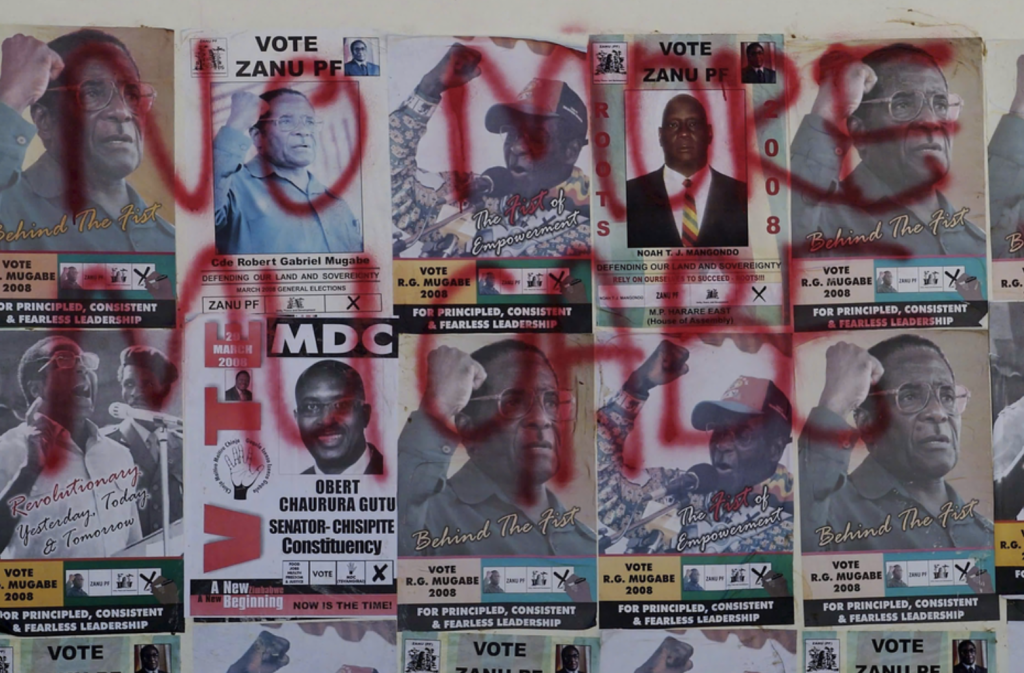
Residents spoke of their growing desperation. Many had resorted to bartering to survive: vegetables, old clothes, maputi (popcorn). Muzuwa, who was married with three children, said he had no work and was “living hand to mouth”. In the sparsely furnished home where he shared the running water in his kitchen with four other families, he introduced me to his wife, two sons and baby daughter, and told me of his political awakening. It had begun in the mid-1990s when he was working in a steel foundry. The government, under pressure from the IMF, embarked on a series of spending cuts. “People were retrenched [made redundant] without any notice or benefits. Food prices went up. Life for workers was tough,” he told me. Meanwhile, the government was embroiled in a series of corruption scandals. Muzuwa became an active union member. “I went into the streets, started telling people we have contributed to this money [the state’s finances] but the coffers are empty,” he said.
At the end of my visit, Muzuwa accompanied me on a rickety old commuter bus back to the centre of Harare, and walked with me towards where I was staying. We exchanged addresses and I gave him my number. I didn’t know when, or if, I would see him again.
In October 2001, back home in London, I received a letter from Muzuwa. It had been almost a year since we’d met, and though we had spoken a few times since, we were little more than acquaintances. His life was in danger, he wrote. He was on bail after being arrested on spurious charges and the police were still pursuing him. He was having to move between safe houses. Could I help him get to England?
His timing was fortunate. Ordinarily, I would have written back saying I was sorry that I couldn’t help, but I’d just received a redundancy payment after losing my job at a magazine. So through a contact in Zimbabwe, I arranged an air ticket for Muzuwa to the UK. A few weeks later, on 18 November 2001, he left Zimbabwe for the first time in his life and landed at Gatwick, where he was interviewed by an immigration officer and claimed asylum.
Along with many of the Zimbabweans on his flight, Muzuwa was put on a bus to Oakington immigration detention centre, a former army camp surrounded by farmland in Cambridgeshire. The Labour government had opened it the previous year to help fast-track asylum claims, in an attempt to cut a growing backlog.
“I felt like a king being served by white men,” Muzuwa later told me of his time at Oakington. He had three meals a day, but he was tormented by the thought of his children back home who had little to eat. He was given a £5 phone card and called his wife in Harare. His wife didn’t have a phone in her house, so he called the neighbours. By the time she got to the phone, the card had run out.

After two days, he was interviewed by a Home Office official. Muzuwa explained that he was a member of Zimbabwe’s main opposition party, the MDC, and gave a detailed description of the torture the Zimbabwean police had inflicted on him. He had been shackled to a table leg, he told them, and made to lie face down on the floor, while he was beaten with a rubber baton. On another occasion, he had been handcuffed, hit with a wooden plank, and whipped with a thick electrical cable.
The official didn’t find Muzuwa’s story credible, and his asylum claim was rejected. “They thought I was an impostor,” Muzuwa said. He appealed against the decision, and after seven days in detention he was released, with instructions to attend a Home Office reporting centre near London Bridge once a week until his asylum appeal could be heard.
Early on 24 November, six days after Muzuwa had landed in the UK, I got a phone call from an official at Oakington, who wanted to check if Muzuwa could stay with me, as he had given them my address as a residence. I agreed, and the next day, Muzuwa arrived in London carrying a transparent plastic bag holding a few clothes given to him by the Red Cross. I went to meet him at Ladbroke Grove tube station, where he greeted me like an old friend. He spent the next few weeks sleeping on my sofa.
Muzuwa was one of many people fleeing Zimbabwe at that time. In 1980, Robert Mugabe had won the country’s first democratic election, and ended 90 years of oppressive white-minority rule. But 20 years on, Mugabe’s government had become increasingly despotic. The economy was in crisis, inflation was rampant and the living standards of ordinary Zimbabweans had plummeted. In 2002, more Zimbabweans than any other nationality apart from Iraqis claimed asylum in the UK, and by 2006, the Home Office estimated that 200,000 Zimbabweans were living in Britain. Many of them worked in the care sector. Back home they were jokingly referred to as “bum technicians” or British Bottom Cleaners – BBC for short – while London became known as Harare North.
Muzuwa spent his first days in Harare North trying to be as helpful as possible. He cleaned the flat. He mastered what seemed like the entire London bus network in a single day with a travel card. He stayed with me for about a month. Whenever he detected the slightest sign that I might be tiring of his presence, he would make himself as unobtrusive as possible, sitting almost motionless for hours.
In March 2002, Muzuwa had his asylum appeal hearing. The evidence was clear that, far from being an “impostor”, Muzuwa was in the vanguard of the rebellion against Robert Mugabe, and therefore faced significant danger of imprisonment and torture if he were to return. The immigration judge granted him indefinite leave to remain in the UK.
“There was this joy of knowing that I’m in a land where I’m safe, where the [Zimbabwean] government cannot reach me. But being away from my immediate family and the people I grew up with was a horrible thing,” Muzuwa told me. Although he had left Zimbabwe, he was still bound to the struggle. Whatever happened to him, his greatest fear was that Zimbabwe would not be liberated.
In London, at a pub opposite the Royal Courts of Justice, where exiled Zimbabweans and their supporters gathered, he met Sarah Harland, a white Zimbabwean who had helped set up a group that assisted asylum seekers, the Zimbabwe Association. Muzuwa had been sleeping on my couch for a month, and Harland said he could live with her and her family for a while.
When we spoke recently, Harland recalled the astonishing impact Muzuwa had within the exiled Zimbabwean community. She recalls an energetic man with “extraordinary spirit” and “a huge heart”, who was also very complex, and at times inscrutable. “He was an insatiable activist,” she said. Muzuwa took his message to whoever would hear it, speaking at Oxford University, the Law Society, the European parliament.
After a few months living with Harland, Muzuwa, along with other Zimbabwean refugees and asylum seekers, moved into a red-brick terrace house in Bermondsey, south-east London, which the local church let to them at subsidised rent. Whenever I visited, plates of chicken and sadza – Zimbabwe’s staple dish, made from maize meal – were offered. The stream of Zimbabweans passing through the property was a microcosm of the country itself. “It was homely and accommodated everybody: Ndebele, Shona, black or white. We were all Zimbabweans who could share food and music,” Muzuwa recently recalled. He learned Ndebele, one of Zimbabwe’s main languages, from one of his housemates. The hallway was always lined with plastic bags filled with secondhand clothes, which Muzuwa and a friend gathered through donations, and sent to the needy in Harare’s townships.
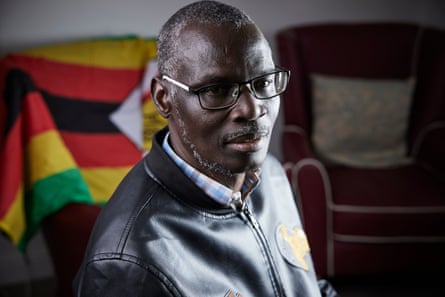
Muzuwa and his friends in Bermondsey, including a white Zimbabwean architect called Alan Wilkinson, started a weekly vigil to protest against human rights violations in Zimbabwe, which still takes place outside the country’s embassy on the Strand every Saturday. Wilkinson, who was openly gay at a time when homosexuality was still taboo among many Zimbabweans, died in 2016. “He was everything to us,” Muzuwa recalled. “We were brought up not to accept gays and lesbians, but [I] learned to accept them. He was a brother.”
During his first few years in the UK, Muzuwa did various jobs, from cat-sitter to newspaper deliverer. He performed in plays about life in exile at the Soho theatre and Rada, and he even went undercover for the comedian and activist Mark Thomas, posing as the head of Zimbabwe’s security in order to expose the illegal sale of stun batons used in torture.
By that point in the early 00s, the question of torture had become especially heated, as evidence mounted that it was unsafe to forcibly return Zimbabweans to their homeland when their asylum claims had failed. The most visible figure in the struggle against removal was an MDC activist named Crispen Kulinji. Despite overwhelming evidence that he had been tortured in Zimbabwe, he was held in detention centres for five months after his asylum claim was rejected. Along with 40 other Zimbabweans, Kulinji went on hunger strike to protest against the UK policy on removals. Muzuwa was constantly in touch with Kulinji while he was locked up, orchestrating his campaign from the outside. “Patson was my torchbearer,” Kulinji later remembered.
Muzuwa and Harland stood bail for Kulinji when he was released, and in 2005 the Daily Mail interviewed him and Muzuwa, running their testimony in a frontpage story headlined, “For Pity’s Sake Let Them Stay”. The Mail, which had railed for decades against a supposedly soft-touch immigration system, now decried as “wretched pretence” the Home Office’s contention that Zimbabwean opposition members faced no danger if they were sent home.
Muzuwa was trying to change Zimbabwe from afar, but he was also racked with guilt over leaving the country. “I’d built a family outside my own blood family. I had a political family. So that guilty conscience was in me. My friends were still on the run or in hiding,” he told me. “I felt I was a coward by not going back.”
Muzuwa has long been haunted by the fate of his friend Tonderai Ndira. The pair first met in the late 90s, when they played music together at trade union meetings at Harare’s Anglican cathedral. Later, they were among the handful of young men who acted as an advance party for the MDC leader Morgan Tsvangirai, assessing the danger in rural areas before he visited.
Around the time Muzuwa fled to the UK, Ndira slipped over the border to South Africa – but unlike Muzuwa, he returned to Zimbabwe a few months later. I first met him there in 2004. He was laid back, yet had the air of someone for whom everyday things no longer mattered; activism was his life. On another occasion when I was talking with Ndira, he looked at me, and with quiet intensity told me to tell Patson to come home and rejoin the struggle. “It’s a direct flight,” he said. (It was a message that I didn’t feel it was my place to pass on.)
In 2007, Ndira was accused, along with 12 other MDC members, of petrol-bombing government installations. After more than five months on remand, Ndira was released when a judge found that the police had relied on witnesses who didn’t exist. By then, activism was taking its toll on Ndira: he caught tuberculosis while being held in police cells, and his body was scarred from torture.
In March 2008, after Mugabe lost a first-round presidential election to Tsvangirai, the state intensified its violence against the opposition. On the morning of 14 May, a gang of armed men in masks barged into Ndira’s home and pulled him from his bed. He was still in his underwear as he was dragged outside, pushed into a truck and driven off, while his children watched from the doorstep. A week later, in a Harare mortuary with failing electricity, Cosmas Ndira recognised his brother’s decomposing remains by a distinctive wrist bangle. The postmortem said Ndira had been asphyxiated.
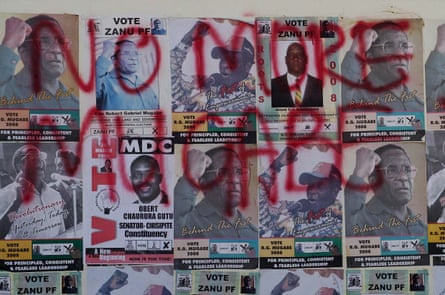
Ndira’s death drew international attention. His friends called him “Zimbabwe’s Steve Biko”, after South Africa’s martyred anti-apartheid hero. He was one of an estimated 200 opposition members and supporters killed in 2008, and one of six personal friends Muzuwa has lost to political violence in Zimbabwe since 2000.
“People have already forgotten about Tonderai, forgotten about his family,” Muzuwa told me earlier this year. “Those who murdered him are still free. I will never live to see the people who killed my friends [brought to] justice. The only justice we can get is when someone’s spirit comes back and haunts them.”
After living in Bermondsey, Muzuwa moved to Leicester in 2004. He felt at home in the city where waves of immigrants from around the globe had settled for generations, with Zimbabweans among the newest arrivals. “You’d get in a taxi and the driver would speak Shona. You think: ‘Hey, am I in Zimbabwe?’” Muzuwa said.
His jobs in Leicester were as varied as in London: he worked in a pie factory, in the catering department at Leicester Royal Infirmary, and as a carer for disabled people. He also appeared in the Channel 4 reality series The Secret Millionaire, in which he introduced an anonymous wealthy property owner to destitute Zimbabwean asylum seekers. He chaired a drop-in centre for asylum seekers and refugees, Zimbabwe Action in Solidarity. The group received the Lord-Lieutenant’s Diamond Jubilee award in 2012. In the same year it sang for the Queen at Leicester Cathedral. (Muzuwa, however, arrived late and was turned away by security. “They told me everyone was seated and it was too late to go in. What an embarrassment,” he later recalled.)
We remained in touch after he left London. I visited and stayed with him and a close mutual Zimbabwean friend in Leicester a few times, met him occasionally when he travelled to London on Saturdays to protest outside the Zimbabwe embassy, and drew on his knowledge when I worked on immigration or Zimbabwe-related stories. Muzuwa seemed to be settled and thriving – especially after his wife and two sons joined him in Leicester in October 2005 under the Home Office’s family reunion scheme.
But other close family members he would never see again. Muzuwa’s daughter Rufaro, his brother Thomas and mother, Mirika, all died in Zimbabwe during his time in exile. “In our culture it’s the worst taboo not to bury your mum, or just give the last respects,” he told me in June. “Seeing your mother and daughter pass away … it becomes a curse in your life. Things won’t go right until you go and see where your mum is buried. That’s the only way to solve the problem.”
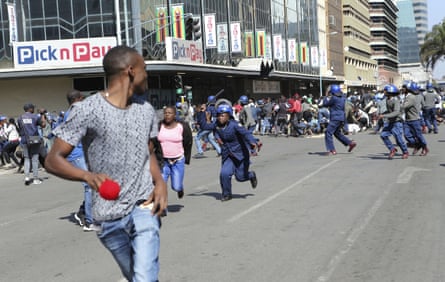
He could not go to his own mother when she was dying, but when my mother died in 2009, Muzuwa was there to pay his last respects. She was the granddaughter of a Scottish pioneer who had arrived in Rhodesia in 1896, during the first war of liberation against white settler rule, six years after Cecil Rhodes’s British South Africa Company had invaded and colonised the country. As a child, my mother was blind to the racial injustice that Rhodesia was founded on. As an adult, she protested against it. When Mugabe came to power, she was proud to join Zanu-PF, before sadness at her homeland’s descent into tyranny set in.
Her funeral in Brighton was ending when Muzuwa and about a half a dozen of his Zimbabwean comrades entered the chapel. They had driven from Leicester to be there. As the vicar fretted, glancing repeatedly at his watch, they unpacked traditional Zimbabwean instruments – ngoma drums and an mbira – before flooding the chapel with beautiful Shona and Ndebele songs.
In the years that followed, our contact grew more sporadic – just the occasional call or text message, or news via social media. By the time Covid-19 struck, and the UK went into lockdown, Muzuwa’s life was falling apart. After splitting from his first wife, he had remarried and had three more children. But when his second marriage disintegrated, he started drinking, and went from teetotal to an alcoholic seemingly overnight. Crispen Kulinji, whose asylum claim had eventually been accepted, was shocked when he saw him. “Patson is sharp, but this was not my brother, the one that I knew,” he recalled.
Muzuwa ended up sleeping in the doorway of Leicester’s old Fenwick department store, drinking himself into oblivion with cut-price booze. “I felt embarrassed, because most of the Zimbabweans in Leicester know me well,” he said later. To avoid them, he moved to Birmingham, where he continued living on the streets until a homeless organisation found him a bedsit. He started going to church and stopped drinking. By 2022, his health was failing.
“It was kidney failure, heart failure,” he told me. “They said my lungs had collapsed, there was no oxygen in my blood. For sure, I missed death by a whisker. Even the doctor said that if I had not come to the hospital within four hours, I would have been dead.”
After months in hospital, Muzuwa’s oldest son – who was six when I first met him in Rugare, but had now been in Britain for 18 years – took him to live with his family in a small village just outside Darlington, in the north-east. From there, Muzuwa later went to the care home where he is now staying.
After almost 22 years in the UK, the village where the care home is situated was the first place Muzuwa had lived where there were apparently no other Zimbabweans. But many of his compatriots travelled from far and wide to see him there. They included his family, as well as Kulinji and other members of his “political family”, such as Shepherd Yuda, a former Harare prison officer who had fled Zimbabwe in 2008 after secretly filming evidence of Zanu-PF’s vote-rigging. Other friends also visited: one who had arrived on the same flight as him from Harare 20 years before and had been detained with him in Oakington, and an old friend from Rugare, who entertained the care home’s residents with Zimbabwean drumming.
Muzuwa’s days are largely consumed by his medical regimen. Three times a week an ambulance takes him to hospital, where he has dialysis for four hours. “This is for the rest of my life,” he said. He finds comfort in the Apostolic faith, a Pentecostal church founded in what was Southern Rhodesia in the 1930s, and which had gained popularity in Zimbabwe and among the diaspora in recent years. Every other Sunday, a friend picks him up and takes him to a church in Leeds.
He was still following every political twist and turn in Zimbabwe. On 23 August, the country goes to the polls for the first presidential and parliamentary elections in five years. President Emmerson Mnangagwa, Mugabe’s former security chief who overthrew him in a coup in 2017, will defend his presidency against Nelson Chamisa, leader of the Citizens Coalition for Change (CCC), a new party formed after the MDC became riven by power struggles and division.
I asked Muzuwa if he thought the change he longed for might finally come. “There is no hope at all,” he replied. In recent weeks, Zimbabwe’s government has passed a new “patriotic bill”, which could punish those who criticise the government with up to 20 years in jail, while clamping down on the opposition, which observers say is in disarray.
Muzuwa told me there is a new generation of activists. The old one is worn out. “When the struggle is endless, people get tired. This is 20 years. I am not the same Patson. Illnesses destroyed us. I can’t ‘toyi-toyi’ in the streets today: jumping and singing and dancing and beating the drums. I can’t do that. And so it destroys the struggle. I’m ageing. We’re ageing,” he said.
In all the years since I have known him, whenever I visited Muzuwa he would invariably accompany me on part of my return journey, starting back in 2000 when I met him in Rugare. This time when I left, he said he would catch the bus to Durham with me. But after walking falteringly to the bus stop, he sat and rested briefly before heading slowly back to the care home, too weak to go further.

